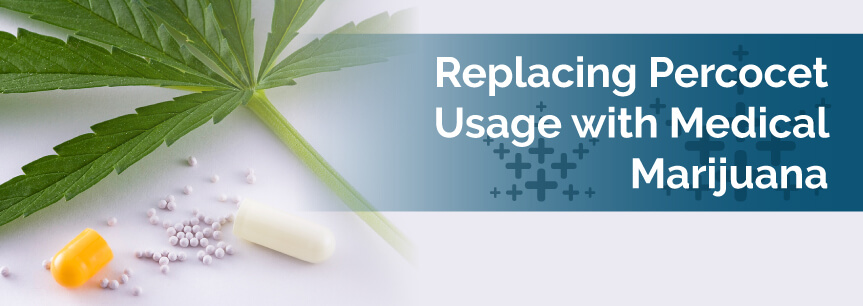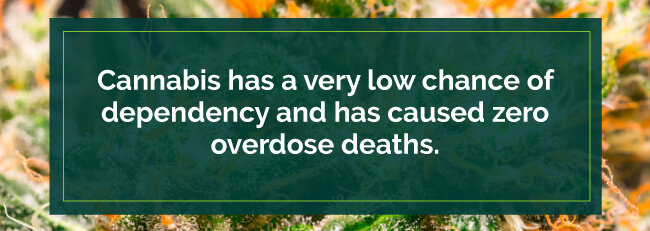
Patients use Percocet, a pharmaceutical drug, to treat their pain symptoms all the time. But, like other medication, Percocet comes with risks — in this case, severe risks.
No wonder so many folks with chronic pain make the switch to medical marijuana! It packs the same punch as Percocet for tons of patients, letting them supplement or totally replace their prescription medication.
Whether you take Percocet, use another strong painkiller or know someone with chronic pain, you should know about medical marijuana as an option. It can work as a natural, safer substitute for harsh medications like Percocet.
Percocet is a medicine used to relieve moderate to severe pain. It contains two different painkillers that work together to address your symptoms — oxycodone and acetaminophen. We often use each type of painkiller on its own, but adding acetaminophen to oxycodone enhances its effects.
While acetaminophen is a relatively mild painkiller, oxycodone is a strong opioid. You can find acetaminophen at any place that sells over-the-counter medications. Oxycodone uses opioids to relieve pain, requiring doctors to take great care when they prescribe it.
Doctors prescribe Percocet in tablet form. Every tablet has 325 mg of acetaminophen in it — the dosage differs depending on the amount of oxycodone in the tablet. Percocet tablets can contain 2.5 to 10 mg of oxycondone.
Since Percocet includes two drugs, it can cause the side effects associated with both of them. Side effects that usually don’t need medical attention include:
On the other hand, contact your prescribing doctor ASAP if you experience the following symptoms:
When in doubt, get in touch with your care provider. Any severe symptom that overlaps with your Percocet use should be addressed immediately.
Doctors prescribe Percocet whenever other options don’t work well enough for a patient with chronic pain. Since Percocet has an opioid in it, they try to prescribe it as a last resort to avoid the risks and side effects associated with opioids.
Chronic pain often counts as a qualifying condition for medical marijuana. Other commonly approved conditions with pain as a major symptom include:
Even if they experience any of the problems, some patients shouldn’t use Percocet because it can cause further issues.
Pregnant patients, patients trying to become pregnant and breastfeeding patients should not take Percocet. If you become dependent on the drug, your baby will become dependent, as well. It can also enter a baby’s system via breast milk.
Some folks should consult closely with their doctor and do careful research before they try the drug. Children and seniors have a higher risk of getting certain side effects. People with respiratory issues, kidney or liver disease, mental health issues and other disorders treated with medications that conflict with Percocet need to take care, too.
The United States has an opioid problem, and prescription medicines like Percocet are a part of it. Every day, 91 Americans lethally overdose on an opioid drug. Many of them involve heroin, but a large number involve prescription painkillers.
In fact, almost half of all deaths from opioid overdoses result from addiction to a prescription opioid. Specifically, more than 40 people out of the daily 91 deaths overdose on a prescription.
If you become dependent on Percocet, you’ll begin to go through withdrawal symptoms if you suddenly stop taking it. Some patients who deal with withdrawal will begin to seek Percocet out in illegitimate ways. Withdrawal symptoms include insomnia, restlessness, irritability, muscle pain and sweating.
Whether related to addiction or not, some patients experience overdose symptoms after taking too much Percocet. If you deal with any of these issues, you should get emergency care. Signs of overdose include lips and skin turning blue, unconsciousness, extreme drowsiness, low pulse, slow breathing and cold skin.
Medical marijuana can protect patients by letting them avoid the addictiveness of Percocet altogether. Cannabis has a very low chance of dependency and has caused zero overdose deaths. Meanwhile, states that offer the option of cannabis medicine have 25% fewer prescription drug overdoses.

We’ve known about the painkilling power of cannabis for decades. Since the 1970’s, several studies have demonstrated that cannabinoids, the components in marijuana, can effectively relieve pain. Scientists conduct ongoing research to pave the way to cannabis’ legitimization as a painkiller.
Both the major cannabinoids, CBD and THC, have pain relieving properties, making just about any kind of marijuana medication suitable for pain. You can choose from medicine such as creams, tinctures, capsules, edibles and the bud itself.
Since so many conditions make you hurt, cannabis also works to relieve other common symptoms of chronic health issues. Marijuana relieves nausea, insomnia, appetite issues and more. So, you can use it to replace or enhance many medications at once.
Depending how much marijuana helps you and what your doctor advises, you can use it to supplement or completely replace painkillers like Percocet. Even if you can’t take cannabis alone for pain, you may be able to switch to a drug with fewer risks.
If you do decide to use medicinal cannabis as a supplement, make sure to discuss your plans with your doctor. When taken with oxycodone, the opioid in Percocet, it can exacerbate the side effects common between both medications. You may feel increased drowsiness, cognitive impairment and dizziness.
Regardless of where you live, you should contact a medical professional before using cannabis medicine. Even patients in recreational states can benefit from getting advice from a cannabis-positive practitioner.
No Information on MarijuanaDoctors.Com should be used to diagnose, treat, prevent or cure any disease or condition. You can view our Full Disclaimer here.